 W
W"99 Luftballons" is a song by the German NDW band Nena from their 1983 self-titled album. An English-language version titled "99 Red Balloons", with lyrics by Kevin McAlea, was also released on the album 99 Luftballons in 1984 after widespread success of the original in Europe and Japan. The English version is not a direct translation of the German original and contains lyrics with a somewhat different meaning. In the US, the English-language version did not chart, while the German-language recording became Nena's only US hit.
 W
W"Aces High" is a song by English heavy metal band Iron Maiden, written by the band's bassist Steve Harris. It is Iron Maiden's eleventh single release and the second from their fifth studio album, Powerslave (1984).
 W
W"American Soldier" is a song co-written and recorded by American country music artist Toby Keith. It was released in November 2003 as the second single from his album Shock'n Y'all. It became a number one hit on the Billboard U.S. Hot Country Songs chart, keeping the top spot for four weeks. Keith wrote the song with Chuck Cannon.
 W
W"Anchors Aweigh" is the fight song of the United States Naval Academy and march song of the United States Navy. It was composed in 1906 by Charles A. Zimmermann with lyrics by Alfred Hart Miles. When he composed "Anchors Aweigh," Zimmermann was a lieutenant and had been bandmaster of the United States Naval Academy Band since 1887. Miles was Midshipman First Class at the Academy, in the class of 1907, and had asked Zimmermann to assist him in composing a song for that class, to be used as a football march. Another Academy Midshipman, Royal Lovell, later wrote what would be adopted into the song as its third verse.
 W
W"The Ballad of the Green Berets" is a patriotic song in the ballad style about the United States Army Special Forces. It is one of the few popular songs of the Vietnam War years to cast the military in a positive light and in 1966 became a major hit, reaching No. 1 for five weeks on the Billboard Hot 100 and four weeks on Cashbox. It was also a crossover smash, reaching No. 1 on Billboard's Easy Listening chart and No. 2 on Billboard's Country survey. Ultimately, the song was named Billboard's #1 single for the year 1966 in a revised end-of-the-year chart, but the original chart showed "California Dreamin'" by The Mamas and the Papas at #1 and "Ballad of the Green Berets" at #10. The two songs tied for #1 on the Cashbox end-of-the-year survey for 1966.
 W
W"The Battle of New Orleans" is a song written by Jimmy Driftwood. The song describes the Battle of New Orleans from the perspective of an American soldier; the song tells the tale of the battle with a light tone and provides a rather comical version of what actually happened at the battle. It has been recorded by many artists, but the singer most often associated with this song is Johnny Horton. His version scored number 1 on the Billboard Hot 100 in 1959. Billboard ranked it as the No. 1 song for 1959, it was very popular with teenagers in the late 50s/early 60s in an era mostly dominated by rock and roll music.
 W
W"Billy Don't Be a Hero" is a 1974 pop song that was first a UK hit for Paper Lace and then, some months later, a US hit for Bo Donaldson and The Heywoods. The song was written and composed by two British songwriters, Mitch Murray and Peter Callander.
 W
W"Boogie Woogie Bugle Boy" is a song which became a major hit for The Andrews Sisters and an iconic World War II tune that was written for the Abbott & Costello comedy film, Buck Privates. It reached number six on the U.S. pop singles chart in early 1941. The song is ranked No. 6 on Songs of the Century. Bette Midler's 1972 recording of the song also reached the top ten on the U.S. Billboard Hot 100.
 W
W"Brothers in Arms" is a 1985 song by Dire Straits, appearing as the closing track on the album of the same name. It was written in 1982, the year of the Falklands War. It was re-released in 2007 as a special edition to commemorate the 25th anniversary of the conflict and raise funds for veterans of it with posttraumatic stress disorder.
 W
W"Danger Zone" is a song, with music composed by Giorgio Moroder and lyrics written by Tom Whitlock, which American singer-songwriter Kenny Loggins recorded and released in 1986. The song was one of the hit singles from the soundtrack to the 1986 American motion picture Top Gun, the best selling soundtrack of 1986 and one of the best selling of all time. According to Allmusic.com, the album "remains a quintessential artifact of the mid-'80s" and the album's hits "still define the bombastic, melodramatic sound that dominated the pop charts of the era."
 W
W"Eyes of the Insane" is a 2006 song by the American thrash metal band Slayer, taken from their 2006 album Christ Illusion. The lyrics explore an American soldier's mental anguish following his return home from the second Gulf War, and are based on an article entitled "Casualty of War" in Texas Monthly magazine. "Eyes of the Insane" was written by vocalist Tom Araya during pre-production for the album. The song was generally well received by critics, and also peaked #15 on the Danish singles charts.
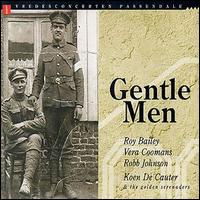 W
WGentle Men is an album released in 1997 by English folk singers Roy Bailey and Robb Johnson in collaboration with Belgian singer Vera Coomans and Belgian jazz band Koen De Cauter and the Golden Serenaders. The album takes the form of a song cycle inspired by the experiences of Johnson's grandfathers during the First World War, and was released as part of the Vredesconcerten Passendale series.
 W
WFor the Andy Griffith Show character, see Goober Pyle.
 W
W"The Great Little Army" is a British military march that was composed by Kenneth J. Alford in 1916. Alford, whose real name is Frederick Joseph Ricketts, was a bandmaster from the British Army/Royal Marines who in his last position he was appointed to, directed the Band of HM Royal Marines, Plymouth. It was made to honour the British and Allied victories that were made in the Western Front. At the time, they were known as "The Contemptible Little Army" by the Imperial German Army.
 W
W"Hero of War" is a 2008 song by Rise Against from the album Appeal to Reason. The song was mistaken to be the album's third single, after a music video of the song was released on the band's Myspace on May 20, 2009. However, it was later revealed it was just a promotional video and "Savior" is in fact, the third single.
 W
WSaving Private Ryan: Music from the Original Motion Picture Soundtrack is the soundtrack album for the 1998 film Saving Private Ryan, directed by Steven Spielberg. The album was produced by composer John Williams and distributed by DreamWorks Records. Recorded in Symphony Hall, Boston, Massachusetts, the scores were performed by the Boston Symphony Orchestra, with two of the ten compositions featuring vocals from the Tanglewood Festival Chorus. The soundtrack runs for almost an hour, while the film itself lasts over two hours.
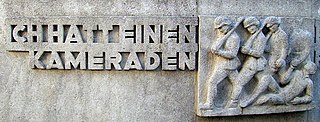 W
W"Der gute Kamerad", also known by its incipit as "Ich hatt' einen Kameraden" is a traditional lament of the German armed forces. The text was written by German poet Ludwig Uhland in 1809. Its immediate inspiration was the deployment of Badener troops against the Tyrolean Rebellion. In 1825, the composer Friedrich Silcher set it to music, based on the tune of a Swiss folk song.
 W
W"In the Army Now" is a song by the South African-born Dutch duo Bolland & Bolland, released in 1982. The song spent 6 consecutive weeks on the top of the Norwegian singles chart. The song was also later recorded by the British rock band Status Quo on their 1986 album, In the Army Now, and their version peaked at number 2 in the UK Singles Chart. It also achieved largest success in German-speaking Europe, France, Norway, Spain and Sweden.
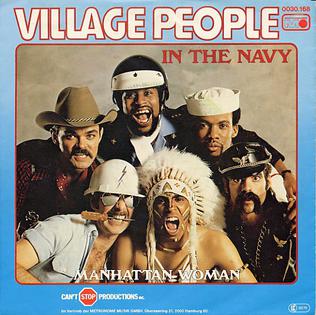 W
W"In the Navy" is a song by the American disco group Village People. It was released as the first single from their fourth studio album Go West. "In the Navy" was the last Top 10 hit for the group in the United States.
 W
W"Invisible Sun" is a song by rock group the Police, released as a single in Europe in September 1981. It was the first single to be released in the United Kingdom from the album Ghost in the Machine and it reached No. 2 on the official chart. The song also reached No. 5 in Ireland and No. 27 in the Netherlands. It was not released as a single in the U.S. In most other territories, "Every Little Thing She Does Is Magic" was chosen as the lead single from the LP.
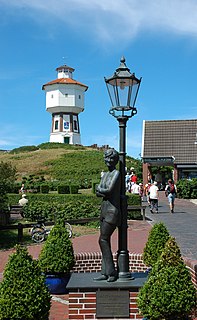 W
W"Lili Marleen" is a German love song which became popular during World War II throughout Europe and the Mediterranean among both Axis and Allied troops. Written in 1915 as a poem, the song was published in 1937 and was first recorded by Lale Andersen in 1939 as "Das Mädchen unter der Laterne".
 W
W"I Am the Very Model of a Modern Major-General" is a patter song from Gilbert and Sullivan's 1879 comic opera The Pirates of Penzance. It has been called the most famous Gilbert and Sullivan patter song. Sung by Major General Stanley at his first entrance, towards the end of Act I, the character introduces himself by presenting his résumé and admitting to a few shortcomings. The song satirises the idea of the "modern" educated British Army officer of the latter 19th century. It is difficult to perform because of the fast pace and tongue-twisting nature of the lyrics.
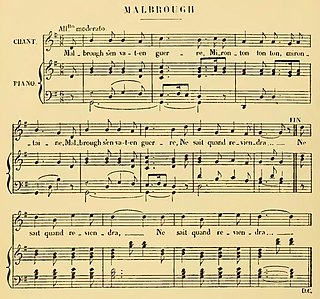 W
W"Marlbrough s'en va-t-en guerre" or "Malbrook s'en va-t-en guerre" is a popular folk song in French.
 W
W"Merck toch hoe sterck" is a Dutch war song and sea shanty, written around 1626 by Adriaen Valerius .The music is based on an Elizabethan lute song written by Thomas Campion in 1606.
 W
W"Mr. Lonely" is a song co-written and recorded by American singer Bobby Vinton. The song was first released on Vinton's 1962 album Roses Are Red.
 W
W"My Son" is a song written and recorded by American country music singer Jan Howard. It is among several songs recorded by country artists during this period that related to the Vietnam War. The song is based on a letter Howard wrote to her son, Jimmy, who was drafted into the war. After writing the letter, she was inspired by family and friends to put it to music. Recording the song in a single take, it was released as a single in 1968.
 W
W"Nineteen" is a song written by Tom Hambridge, Jeffrey Steele, and Gary Nicholson. The song was originally recorded by the country music duo Waycross, whose version peaked at number 54 on the Billboard Hot Country Songs chart in July 2007. Taylor Hicks later recorded the song on his 2009 album The Distance, although his version of the song was not released as a single. It was then recorded by country music singer Billy Ray Cyrus, on his album I'm American, which was released on June 28, 2011. Cyrus' version of the song was released as the album's second single on September 26, 2011. Clayton Bellamy also recorded it on his 2012 album Everyone's a Dreamer.
"No Bravery" is a pop rock song written by British singer James Blunt and Sacha Skarbek for Blunt's debut album Back to Bedlam. The song was produced by Tom Rothrock and Jimmy Hogarth and received a positive reception from music critics. The song is written about Kosovo war while Blunt was serving there with NATO peacekeepers. It was released as the fifth single in April 2007, exclusively in France. The track peaked at No. 15 there. In the United States, "No Bravery" received heavy airplay but was not released as a single.
 W
WThe Åland War is a 1854–1856 conflict between the Russian Empire and the allied France and Britain in part of the Crimean War, taking place along the Grand Duchy of Finland in the Gulf of Bothnia and the Gulf of Finland. The war is largely named after the Battle of Bomarsund off the Åland Islands. Although the name of the war largely refers to Åland, battles were also fought in other coastal towns of Finland.
 W
W"Orange Crush" is a song by the American alternative rock band R.E.M. It was released as the first single from the band's sixth studio album, Green, in 1988. It was not commercially released in the U.S. despite reaching number one as a promotional single on both the Mainstream and Modern Rock Tracks. It peaked at number 28 on the UK Singles Chart, making it the band's then-highest chart hit in Britain, where they promoted the song by making their debut appearance on Top of the Pops.
 W
W"Over There" is a 1917 song written by George M. Cohan that was popular with the United States military and public during both world wars. It is a patriotic song designed to galvanize American young men to enlist and fight the "Hun". The song is best remembered for a line in its chorus: "The Yanks are coming."
 W
W"Prinz Eugen, der edle Ritter" is an Austrian-German folksong about the victory of Prince Eugene of Savoy in 1717 during the Austro-Turkish War of 1716–1718. It tells of the bravery of Prince Eugene, his companion Prince Ludwig who lost his life in the battle, and their soldiers in defeating the Turks and recovering the city of Belgrade for the Holy Roman Empire. The oldest known record of the song comes from a handwritten songbook of 1719. The lyricist is unknown.
 W
W"Psycho" is a song by the English rock band Muse from their seventh studio album Drones, released on 12 March 2015 as a promotional single and the first from the album. It was later featured as the B-side to the official lead single later that month, "Dead Inside".
 W
W"Riding with Private Malone" is a song written by Wood Newton and Thom Shepherd, and recorded by American country music artist David Ball. It was released in August 2001 as the first single from his album Amigo. The song reached a peak of #2 on the Billboard Hot Country Singles & Tracks charts chart, and #36 on the Billboard Hot 100. It was Ball's first Top 40 country hit since "Look What Followed Me Home" in 1995. USA Today referred to it as "the country song that tapped most subtly and profoundly into the emotions of its audience" after the September 11 attacks, even though it was released to radio a few weeks before the attacks.
 W
W"Sky Pilot" is a 1968 song by Eric Burdon & the Animals, released on the album The Twain Shall Meet. When released as a single the song was split across both sides, due to its length (7:27). As "Sky Pilot " it reached number 14 on the U.S. pop charts and number 15 on the Canadian RPM chart.
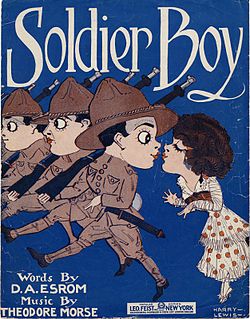 W
WSoldier Boy is a World War I era song released in 1915. D.A. Esrom wrote the lyrics. Theodore Morse composed the music. Leo Feist, Inc. of New York, New York published the song. Artist Harry Lewis designed the cover art for the sheet music. On the cover, there are three cartoon soldiers. One has his head turned to kiss a woman behind him. The song was written for both voice and piano. It is told from the point of view of a woman who is proud of her soldier boy. She addresses the soldier directly in the chorus:Soldier boy, One kiss before you go, soldier boy I'll miss you, that you know, Ev'ry night I'll pray for you far away, And trust to Him above To send you back some day In my heart A love will always yearn, And I'll wait for your return. So go and fight for the cause you know is right, God bless you, my soldier boy.
 W
W"Soldiers of Misfortune" is the lead single from Filter's fourth studio album, Anthems for the Damned. It premiered on Myspace on February 25, 2008 and was released to radio stations on March 18, 2008. "Soldiers of Misfortune" was added to Amazon MP3 and iTunes on April 29, 2008.
 W
W"Suicide Is Painless" is a song written by Johnny Mandel (music) and Michael Altman (lyrics). It was the theme song for both the movie and TV series M*A*S*H.
 W
W"Travelin' Soldier" is a song written and originally recorded by American country music artist Bruce Robison in 1996 and again, in rewritten form, in 1999. It was later recorded by Ty England on his 1999 album, Highways & Dance Halls. The first rendition to be issued as a single was by the Dixie Chicks in December 2002, from their album Home. It became the group's sixth and final single to reach No. 1 on Billboard "Hot Country Singles & Tracks". A version of the song featuring Natalie Maines of the Dixie Chicks, Bruce Robison and Robison's wife, Kelly Willis, appears on KGSR's Broadcasts Vol. 13 album. Aaron Lewis also recorded a cover of the song as a duet with his daughter Zoe on his 2016 album Sinner.
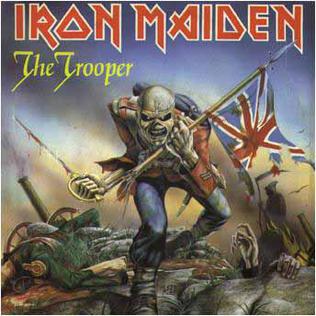 W
W"The Trooper" is a song by the English heavy metal band Iron Maiden. It was released as the second single on 20 June 1983 from the band's fourth studio album, Piece of Mind (1983). It was one of only a few songs to get much radio airplay in the United States, thus peaking at No. 28 on the US Mainstream Rock charts. It also achieved success in the United Kingdom, peaking at No. 12 in the UK Singles Charts as well as gaining a much better reception than the band's previous single, "Flight of Icarus". It is also the band's first release to feature Nicko McBrain, who replaced Clive Burr on drums in 1982.
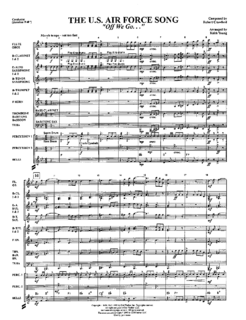 W
W"The U.S. Air Force" is the official song of the United States Air Force, adopted in the late 1940s, and is often referred to as "Wild Blue Yonder".
 W
WThe following is a list of the notable authorized marches for various organisations of the Canadian Armed Forces. The first march listed is the march most commonly performed for that organisation on parade; it is commonly referred to simply as that organisation's "march" or "march past". In addition, many organisations also have additional pieces for slow marches, marches for mounted parades, pipe marches, etc.; they are subsequently listed and footnoted as applicable.
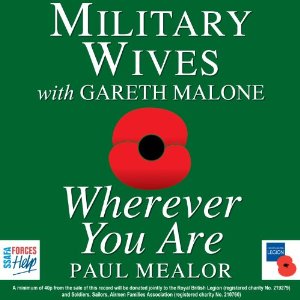 W
W"Wherever You Are" is a song written by Paul Mealor and performed by the Military Wives Choir, sung by ladies from Chivenor and Plymouth under the direction of Gareth Malone. It is a spin-off of the BBC Two television series The Choir: Military Wives. It was released on 19 December 2011 following a campaign to make it the 2011 UK Christmas number one. The song entered the UK Singles Chart at number 1, claiming the Christmas number 1 – selling more than 556,000 copies in the week, more than the rest of the Top 12 combined. The song also claimed the status of the biggest first week sales since "A Moment Like This" by Leona Lewis sold over 571,000 copies in its first week in 2006. The song was included on their debut studio album In My Dreams.